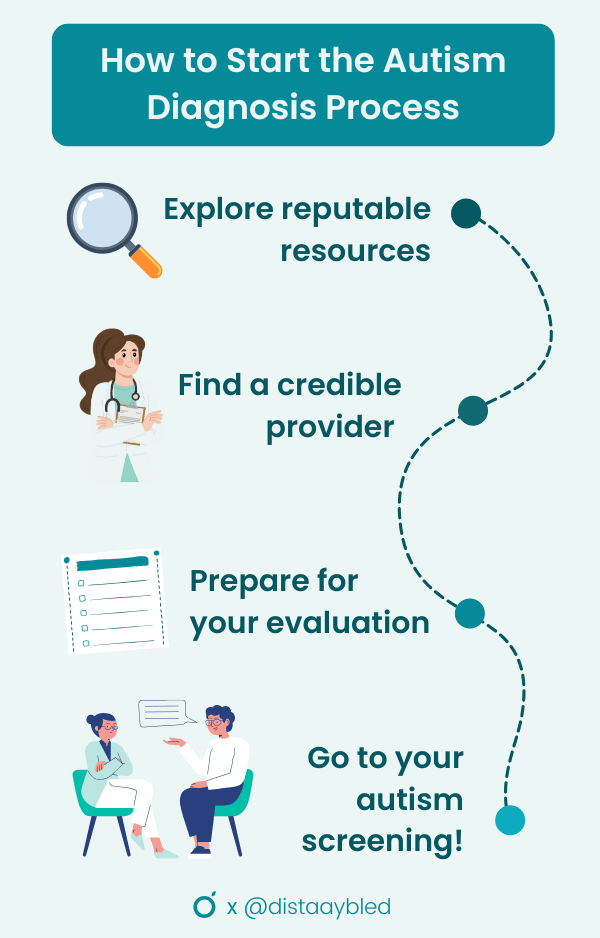
Patient Insights: Tayler, a disability and neurodivergence advocate, takes us through her experience with getting evaluated and diagnosed with autism spectrum disorder (ASD), offering tips and guidance for navigating her adult autism diagnosis.
As an autistic person, I was terrified to get a professional evaluation when I suspected that I was on the spectrum. I was concerned that I wouldn’t be “autistic presenting” enough, that I was masking my autism traits too hard, or that the evaluator wouldn’t be as well-versed in adult autism as they should be.
To cope with the anxiety that comes with preparing for an autism test, I did all of the prep I could, and I wanted to share it with you in case you’re experiencing the same emotions.
Curiosity Around Getting an Autism Diagnosis
If you are an adult seeking out an autism test, you likely suspect you are autistic or have even explored self-diagnosis. There are many reputable online resources that can help you start the process of exploring the curiosities or suspicions you have.
Here are some of the tests regularly used by professionals to get a fuller picture of your experience:
These questionnaires by themselves are not diagnostic, but they can be helpful during the evaluation process or when approaching your provider about requesting an evaluation.
A Note on Self-Diagnosis
Self-diagnosis is typically discouraged to prevent misinterpretation of symptoms and to ensure that conditions are addressed safely, meaning individual research should be navigated thoughtfully. In some cases, social media is a helpful starting point, but it can also circulate oversimplified or misleading information.
Even with this in mind, your curiosities are valid. Seeking out information from reputable sources, learning about diagnostic criteria, and connecting with the autism community can be useful for your own understanding and to inform your decision about whether or not to seek out care. It’s okay to learn and listen to the experiences of other autistic people to help validate your own experiences and better understand how your brain processes information.

How to Get Tested for Autism
Finding an Autism Professional
Finding a knowledgeable expert in the field is incredibly important for your autism evaluation. Many therapists do not have the specialized knowledge or skill set to accurately assess for autism, which can lead to inaccurate diagnoses. This can leave you feeling confused and invalidated and can cause a lot of damage, especially if you’re misdiagnosed with something else.
Searching “adult autism assessment near me” can help narrow down a handful of people in your area. Make sure to read their biographies to ensure that they are familiar with diagnosing autism regularly.
Preparing for Your Autism Test
Preparation for your autism evaluation can look different for everyone. Some people will want to do as much research as possible, while others may want to go in blind. I used Guava to make a Visit Prep summary and wrote down all of the autistic characteristics I noticed in myself or that other people had pointed out.

It’s normal to be anxious before and after your evaluation–this can cause you to forget important pieces of information or questions you had coming in. To ensure I didn’t forget anything, I chose to include tons of detail in my Visit Prep summary.

I even brought in some research relevant to my previously diagnosed hypermobility, since studies have found a correlation between hypermobility spectrum disorders and autism. Fortunately, my evaluator was up to date on this research and agreed that it’s something professionals in the field should be aware of.
To prevent yourself from becoming overwhelmed or stressed out by the screening, I recommend spending time processing your emotions and preparing yourself for a possible draining evaluation. To help with this, you might also want to make sure your schedule is open afterwards.
I was very fatigued after my evaluation and was glad that I didn’t have any commitments for the remainder of the day. Here are some other tips to help take care of yourself physically:

Some offices may do a “pre-evaluation screening”, where you meet with an assistant or fill out some questionnaires before your appointment. This is totally normal–they’re just collecting all the information necessary for your assessment to go smoothly.
During Your Autism Screening
When you arrive, you’ll check in at the front desk. It’s normal to be anxious and worried about how the appointment will go, so using the restroom while you wait to be called can give you a distraction to ground yourself.
You can expect the assessment to take 1-3 hours, depending on how much conversing occurs. They’ll likely go over your medical and psychiatric history, and you can add any information you think is important (this is when I mentioned the hypermobility and autism connection). They might also go over your questionnaire results at this time–they use these to get a better understanding of your processing outside of a clinical setting.
Eventually, they’ll start going through the DSM-5 diagnostic criteria. They may explain the criteria in a simplified way, or they may read it word for word, so don’t be afraid to ask for clarification or examples when you don’t understand what’s being asked. Remember, there are no wrong answers.
Taking your time, collecting your thoughts, and using the Visit Prep you created on Guava beforehand can help guide your answers if you feel overwhelmed. At the end, they might tell you their impression, or they might say you’ll need to wait until they’ve finalized their official report. If you’re curious, feel free to ask how you’ll receive the information.
After the Assessment
Spending the rest of the day doing self-care and resting is a great way to show your brain and body some love. It can feel agonizing waiting for the official assessment review to be sent, but reminding yourself that your value doesn’t come from whatever the report says will help ground you. Your experiences are valid regardless of the outcome.






